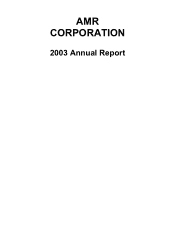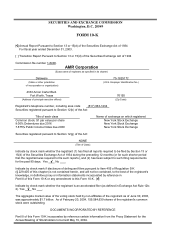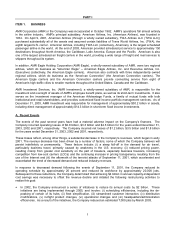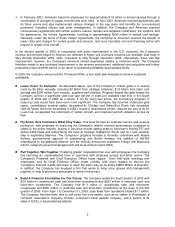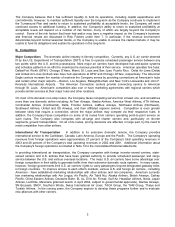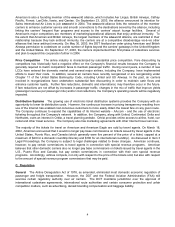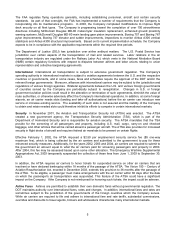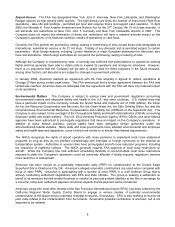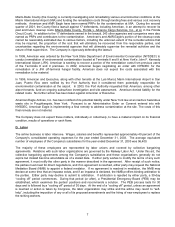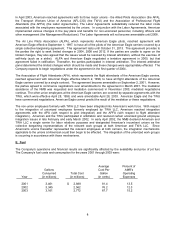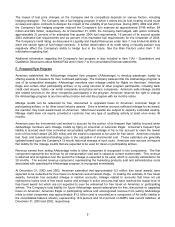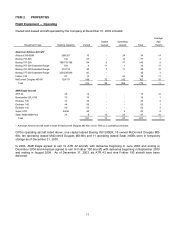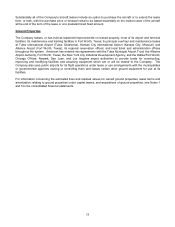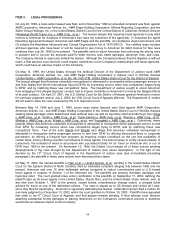American Airlines 2003 Annual Report Download - page 6
Download and view the complete annual report
Please find page 6 of the 2003 American Airlines annual report below. You can navigate through the pages in the report by either clicking on the pages listed below, or by using the keyword search tool below to find specific information within the annual report.
4
American is also a founding member of the oneworld alliance, which includes Aer Lingus, British Airways, Cathay
Pacific, Finnair, LanChile, Iberia, and Qantas. On September 23, 2003, the alliance announced its intention for
Swiss International Air Lines to join oneworld in 2004. The oneworld alliance links the networks of the member
carriers to enhance customer service and smooth connections to the destinations served by the alliance, including
linking the carriers' frequent flyer programs and access to the carriers' airport lounge facilities. Several of
American's major competitors are members of marketing/operational alliances that enjoy antitrust immunity. To
the extent that American and British Airways, the largest members of the oneworld alliance, are restricted in their
relationship because they lack antitrust immunity, the carriers are at a competitive disadvantage vis-à-vis other
alliances that have antitrust immunity. On May 30, 2003, the DOT finalized an order giving American and British
Airways permission to codeshare on a wide number of flights beyond the carriers’ gateways in the United Kingdom
and the United States. On September 17, 2003, the carriers implemented their first phase of codeshare services
and plan to expand this cooperation further in 2004.
Price Competition The airline industry is characterized by substantial price competition. Fare discounting by
competitors has historically had a negative effect on the Company’s financial results because the Company is
generally required to match competitors' fares to maintain passenger traffic. During recent years, a number of new
LCCs have entered the domestic market and several major airlines, including the Company, have implemented
efforts to lower their costs. In addition, several air carriers have recently reorganized or are reorganizing under
Chapter 11 of the United States Bankruptcy Code, including United and US Airways. In the past, air carriers
involved in reorganizations have undertaken substantial fare discounting in order to maintain cash flows and
enhance customer loyalty. Further fare reductions, domestic and international, may therefore occur in the future.
If fare reductions are not offset by increases in passenger traffic, changes in the mix of traffic that improve yields
(passenger revenue per passenger mile) and/or cost reductions, the Company’s operating results will be negatively
impacted.
Distribution Systems The growing use of electronic ticket distribution systems provides the Company with an
opportunity to lower its distribution costs. However, the continuous increase in pricing transparency resulting from
use of the Internet has enabled cost-conscious customers to more easily obtain the lowest fare on any given route.
The Company continues to expand the capabilities of its Internet website - AA.com - and the use of electronic
ticketing throughout the Company's network. In addition, the Company, along with United, Continental, Delta and
Northwest, owns an interest in Orbitz, a travel planning website. Orbitz provides online access to airline, hotel, car
rental and other travel services. The Company also has marketing agreements with other Internet travel services.
The majority of the tickets for travel on American and American Eagle are sold by travel agents. On March 18,
2002, American announced that it would no longer pay base commissions on tickets issued by travel agents in the
United States, Puerto Rico, and Canada (which generally were five percent of the price of a ticket, capped at a
maximum of $20 for a domestic roundtrip itinerary and $100 for an international roundtrip). As discussed in Item 3
Legal Proceedings, the Company is subject to legal challenges related to these changes. American continues,
however, to pay certain commissions to travel agents in connection with special revenue programs. American
believes that other domestic carriers also no longer pay base commissions on tickets issued by travel agents in the
U.S., Puerto Rico and Canada, but pay certain commissions in connection with their own special revenue
programs. Accordingly, airlines compete, not only with respect to the price of the tickets sold, but also with respect
to the amount of special revenue program commissions that may be paid.
C. Regulation
General The Airline Deregulation Act of 1978, as amended, eliminated most domestic economic regulation of
passenger and freight transportation. However, the DOT and the Federal Aviation Administration (FAA) still
exercise certain regulatory authority over air carriers. The DOT maintains jurisdiction over the approval of
international codeshare agreements, international route authorities and certain consumer protection and unfair
competition matters, such as advertising, denied boarding compensation and baggage liability.

